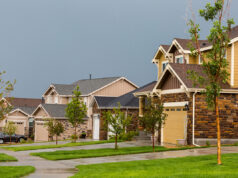If you noticed an abnormally high lack of snow this winter, you weren’t wrong – The recent Colorado cold season was the third driest winter on record, and that’s got plenty of firefighters fearful of the coming wildfire season. The simple fact of a very dry winter is enough to strike fear into the hearts who make a living tackling fires across the Centennial State.
Troy Wineland, the water commissioner for the Blue River Basin, made a cautious assessment of the upcoming firefighting season at the Wildfire Council. The Wildfire Council is made up of officials from Summit County, the U.S. and Colorado Forest Services, and local firefighting outfits from across the state.
Wineland began his presentation to the Council by asking the different groups and districts how they felt about the current snowpack conditions across the state. Snowpack plays a large part in determining the potency of wildfire season. The higher the snowpack, the less potential danger. The historically dry season means snowpack is minimal.
That’s how the officials responded, conditions looked worse than they’ve seen in years. Wineland confirmed the Council’s fears with statistics and those frightening words, “Third driest winter on record.”
Wineland has seen with his own eyes the bad conditions, “What stands out to me is how snow-bare places like Green Mountain are,” Wineland said. “It’s bare. That gives me pause.”
The degree of dryness varies throughout the state. Summit County is at a healthy 88% of normal snowpack levels, but other portions of the state are harder hit.
Southern Colorado is the worst portion of the state with portions as low as 30% of their average.
2017 was the third driest Winter on record, but you don’t have to go far back to find the other driest seasons. 2002 and 2012 were the other two driest Winters the Centennial State has ever seen. Both years saw numerous damaging wildfires.
The message didn’t venture far off standard message – plan for the worst and hope for the best. Matt Benedict, captain of the Red, White, and Blue Fire District which oversees Breckenridge stressed the importance of starting mitigation immediately. “We’re starting to train firefighters early,” Benedict said. “We want to start talking to the public early. Please, please, talk to homeowners and ask them to start preparing their land with chipping and moisture control.”








